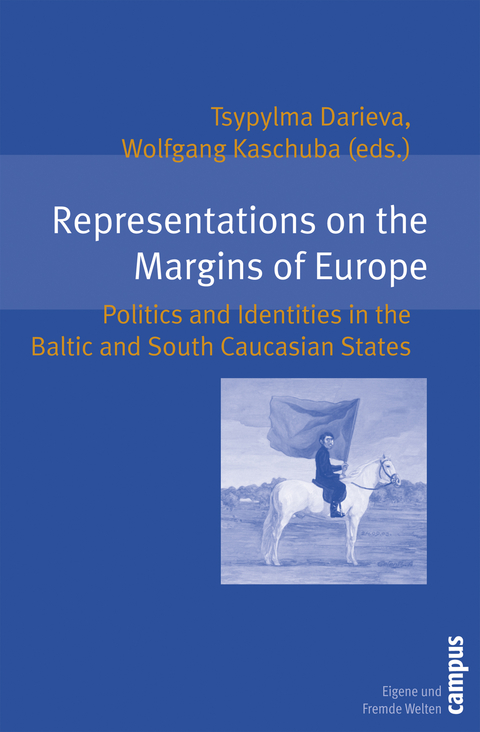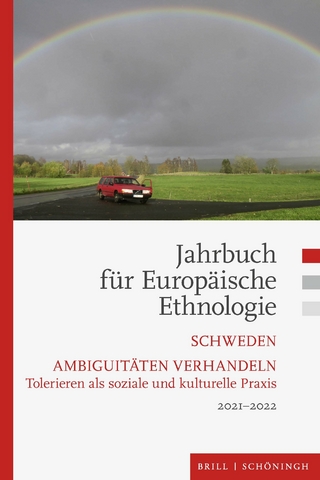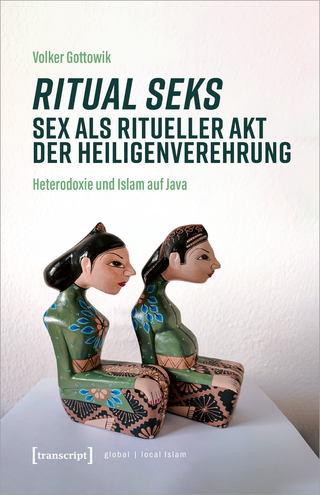
Representations on the Margins of Europe
Campus (Verlag)
978-3-593-38241-8 (ISBN)
Der Kurs hin zur Europäischen Union führte in den baltischen und südkaukasischen Staaten zu dramatischen Veränderungen. In diesem Band wird untersucht, wie die Menschen die Umwälzungen verarbeiteten und wie sich Zugehörigkeit oder Nichtzugehörigkeit zu Europa im alltäglichen Leben bemerkbar machen. Nicht zuletzt werden die Auswirkungen auf die jeweiligen nationalen und lokalen Identitäten und die Ursachen des neuen Nationalismus und Neoliberalismus in Eurasien erläutert
Tsypylma Darieva ist wissenschaftliche Mitarbeiterin am Institut für Europäische Ethnologie an der Humboldt Universität Berlin. Wolfgang Kaschuba ist dort Professor.
Contents
Acknowledgements
Introduction: Politics and Identities on the "Margins"
of New Europe
Tsypylma Darieva and Wolfgang Kaschuba
Old and New Europe: Representations, Imaginations, Stagings
Wolfgang Kaschuba
Icons
"Windows" Project Ad Marginem or a "Divided History"
of Divided Cities? A Case Study of the RussianEstonian
Borderland
Olga Brednikova
From Silenced to Voiced: Changing Politics of Memory
of Loss in Armenia
Tsypylma Darieva
Iconography of Historical Memory and Armenian National
Identity at the End of the 1980s
Harutyun Marutyan
Neoliberal Imaginations, Subject Formation, and
Other National Things in Latvia, the Land that Sings
Dace Dzenovska
Narratives
Estonia and its Escape from the East: The Relevance of
the Past in RussianEstonian
Relations
Karsten Brüggemann
Bargaining Armenianness: National Politics of Identity
in the Soviet Union after 1945
Maike Lehmann
Armenian Statehood and the Problems of European
Integration as Reflected in School Education
Artur Mkrtychian
Soviet Armenian Identity and Cultural Representation
Hrach Bayadyan
Yet Another Europe? Constructing and Representing Identities
in Lithuania Two Years after the EU Accession
Asta Vonderau
Histories of Violence: National Identity and Public
Memory of Occupation and Terror in Estonia
David Feest
Rites
Troubles and Hopes - Armenian Family, Home and Nation
Levon Abrahamian
Celebrating Identities in PostSoviet
Georgia
Florian Mühlfried
Barth, "Yeraz", and PostSoviet Azerbaijan: Inventing
a New SubEthnic Identity
Bahodir Sidikov
The Staging of Politics and the "Folklorization" of
Political Discourse
Ashot Voskanian
Afterword: Representations of the National on the
Fringes of Europe
Jörg Baberowski
Notes on the Contributors
Index of Geographical and Political Names
List of Figures
One of the central features of the current transformation on the Eurasian continent after socialism relates to the notion of "experiencing Europe"1. The tectonic shifts in West European boundaries and the geographic fragmentation have raised many questions about the ways of social and cultural remaking of collective identities and belonging to "remote" regions of the "New Europe". Since the Baltic nations joined the European Union, debates about reorganizing post Soviet republics have grown increasingly heated. "Representations on the Margins of Europe" presents case studies in the post socialist South Caucasian and Baltic states, those regions which since 2004 have joined or are expected to join the European Union. The fact is that the previous relative stability of identities, social categories, and national narratives in this region that served well for the recent past became problematic for representations of the present and future. The emotions of national liberation movements in the Baltic States and South Caucasian republics at the end of the 80s have 15 years later been replaced by the sentiment of "to-be-a-part-of-Europe ". Though not exhaustive, the range of contributions collected here covers a span of three South Caucasian and three Baltic countries with their different modes of symbolic redefinition of geographical and political belonging, cultural division and unit. Focusing mostly on the contemporary postSoviet period, the chapters demonstrate the specifics of the interplay between local representations of national identities and a larger political affiliation to New Europe. The question is: how do the citizens in the Baltic and South Caucasian states cope with EU expansion and the feeling of existing simultaneously "inside" and "outside" Europe?
Anthropologists to understand post socialist transformation have done significant work, and a key to this approach was to pose questions about such problems like the creation of markets, new property relations, and the construction of democracy.2 Katherine Verdery is right in arguing that "the post socialist change is much bigger"3, and this idea helps to throw light on the intersecting facets of the contributions collected here. After socialism, the tectonic shifts of European boundaries and in the hierarchy of the relationships of center and periphery led to new challenges that small nationstates had to face in a very short time after gaining independence: symbolically remarking territories, reordering their meaningful world, and giving new contours to national histories and memories not only as "local" but also as "European". And this is an uneasy balancing act, as the contemporary logic of local identity politics, the regeneration of nationalism, hardly fits the basic format of European selfrepresentation. Moreover, it occurs in those societies where the notion of belonging to political or cultural "Europe" was always contested. As some chapters of this book show, whereas the Western core of the European project has long promoted a culturally integrative, more inclusive ideology of a new European unit, national narratives in these states (re) form their identity in terms of difference from their neighbors by establishing new linguistic, cultural, or religious boundaries. Apparently, "Europeanization" faces a serious conflict here between the integrative political center and the particularistic "periphery". This distinction makes the contrast between the "old" and "new" Europe visible not only in a demonstrative presentation of political values close to the US policies but also in an unstable redefinition of local collective identities. Alongside the recognition of the EU as a powerful political institution where a new "promised world" is being designed, often influenced by postnational ambitions, the radical change in the small societies includes the creation of nationstates and the marking of territories as "ours" by introducing completely new calendars, by establ
| Erscheint lt. Verlag | 12.9.2007 |
|---|---|
| Reihe/Serie | Eigene und fremde Welten ; 3 |
| Co-Autor | Levon Abrahamian, Jörg Baberowski, Hrach Bayadyan, Olga Brednikova, Karsten Brüggemann, Dace Dzenovska, David Feest, Maike Lehmann, Harutyun Marutyan, Artur Mkrtychian, Florian Mühlfried, Bahodir Sidikov, Asta Vonderau, Ashot Voskanian |
| Verlagsort | Frankfurt |
| Sprache | englisch |
| Maße | 142 x 214 mm |
| Gewicht | 495 g |
| Themenwelt | Sozialwissenschaften ► Ethnologie ► Völkerkunde (Naturvölker) |
| Schlagworte | Armenien • Armenien /Postsozialismus • Armenien/Postsozialismus • Asarbaitschan • Asarbeitschan /Postsozialismus • Asarbeitschan/Postsozialismus • Baltikum; Politik/Zeitgeschichte • Baltikum /Postsozialismus • Baltikum/Postsozialismus • Baltikum; Volkskunde • Estland • Georgien • Georgien /Postsozialismus • Georgien/Postsozialismus • HC/Ethnologie/Völkerkunde • Litauen • Osteuropa; Politik/Zeitgesch. • Osteuropa; Volkskunde • Südkaukasien; Politik/Zeitgeschichte • Südkaukasien; Völkerkunde |
| ISBN-10 | 3-593-38241-5 / 3593382415 |
| ISBN-13 | 978-3-593-38241-8 / 9783593382418 |
| Zustand | Neuware |
| Haben Sie eine Frage zum Produkt? |
aus dem Bereich


